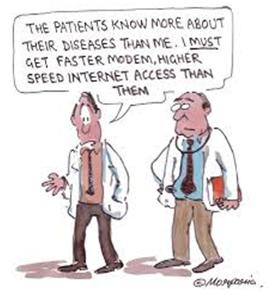
Becoming a patient is automatic, the minute you are born you become one. As you go through life you become a patient to more healthcare providers. The title is what you make it, decades ago patients just listened to their doctors. Now, we have to listen and discuss any issues related to our health. It many ways it is easier said than done. So what do we do to become an empowered patient (or encourage someone to be)?
There are three major things that I believe prevent patients from becoming empowered.
1. Lack of knowledge on health issues and/or where to find accurate health information
2. Lack of access to healthcare data, independent of seeing a doctor
3. Lack of ability to engage in conversation with healthcare providers
Notice all of my points start with “lack”, there is a reason for it. If we search for information, really dig into what we are looking for, we can overcome what we are lacking.
This is where patient advocates, empowered patients, caregivers and healthcare providers need to join forces. Everyone benefits from an empower patient. It doesn’t take a lot of effort and everyone can do it, regardless of their diagnosis. Reading up on your condition will help you decide what questions you need to ask. For example, for people with Immune Thrombocytopenia, we cannot have NSAIDs, so what OTC pain relief should we turn to? Are there certain food/drink items we need to avoid? I found a wealth of information on this topic, I made sure to bring it with me to my appointment so I could discuss it with my doctor.
The other issue we face with healthcare data is having access to it. Chances are all of your doctors aren’t part of the same group. The data is not accessible by all of them, so you are the middleman. This is why we need to allow patients to OWN their data! My OB/GYN wants to know what my hematology team thinks so she can address my bleeding issues. She wants their notes and my blood results. Thankfully, my doctors have empowered me with my data so I can provide that to my other doctors. Many patients aren’t as lucky. This is where healthcare providers have to step up to the plate. The patient should own their data, imagine how much time it saves when you don’t have to waste manpower requesting info from other offices.
While the above two points are important, none of it is possible without talking to your doctors. Communication makes a big difference, but I feel that there is a wall built between patient and provider. In some cases, the doctor needs to start the conversation, especially if the patient seems shy or lacks the confidence to discuss their issues (I can see this being a large issue if a patient is embarrassed about their diagnosis). Patients should know that in order to get the most out of your visits with your doctor, you need to speak up! I have posted in the past about making lists with questions and concerns. Be organized and be informed.
